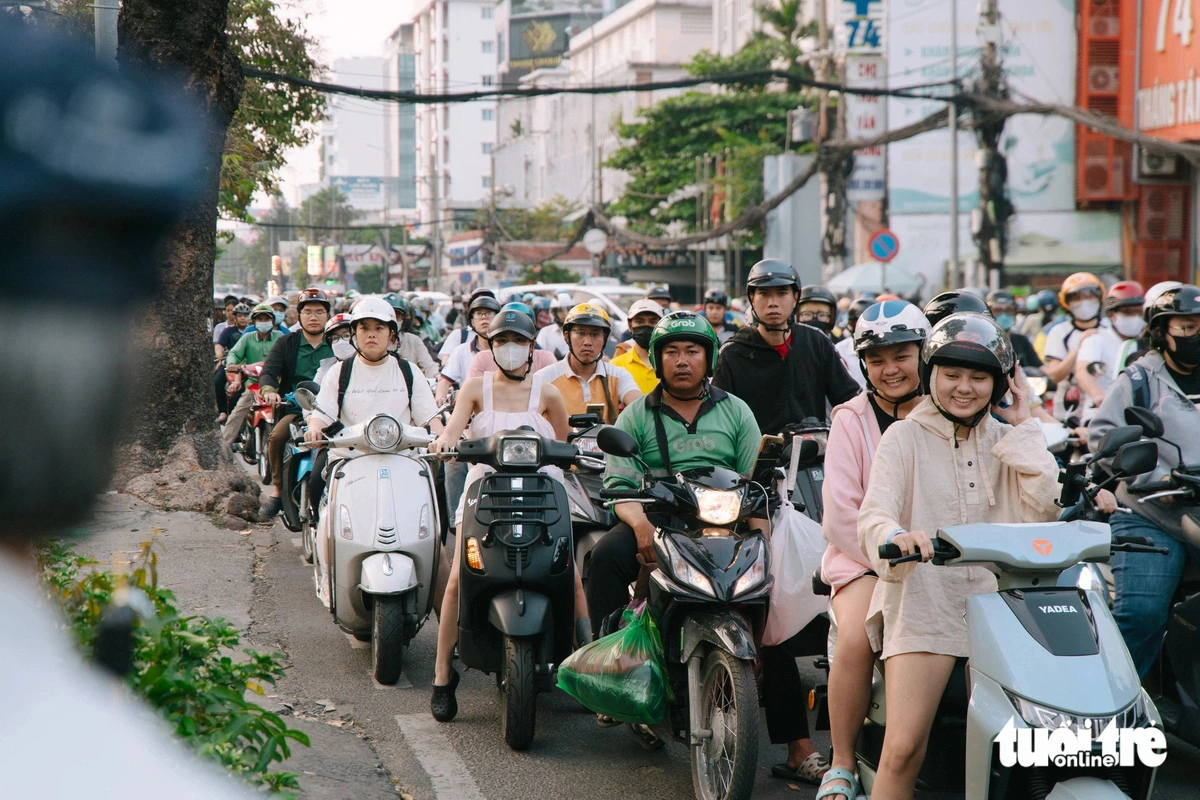The first script I teach my students is usually about a character's journey. Some event forces him to leave his safe environment and embark on a journey to achieve some goal in life.
That goal might be as simple as escaping traffic to get home to family, or deeper, like finding peace within oneself.
Of course, this journey is not simple or easy. There will be countless obstacles, challenges, and hardships, not just from external factors but also from conflicts among those around him and within himself.
These days, in [Ho Chi Minh City], almost every road has traffic jams. Each person's journey home is like a small script filled with elements of goals and obstacles. We reach an intersection, wait for the red light for dozens of seconds, only to find the next intersection takes even longer.
We pass hundreds of people around us, turn onto another street, and encounter even denser traffic, the air becoming thicker.
Decree 168, which [has been in effect since January 1 and] regulates traffic violations, has made people comply so strictly that I feel they are characters in art films where filmmakers tend to overlook drama to focus on the expression of life and delve into different layers of emotion.
Looking at images of the city recorded with its long lines of cars, somewhat orderly and neat in its own way compared to before, brings feelings that transcend reality.
Amid the noise of car horns and the thick air of the city, we seem to be drawn into a mechanical rhythm of life.
The character in this journey not only faces physical challenges but also struggles with invisible pressures: impatience, the feeling of being trapped, and the obsession with not being able to move forward.
From another perspective, hours of traffic jams are like a large-scale rehearsal for society where each person must learn to adjust themselves, accept limitations, and interact with others.
It is a journey not just to reach a physical goal but also to explore and refine oneself. Can we maintain calmness, empathy, or will we let anger and fatigue take over?
In screenwriting classes, I often emphasize that the importance does not lie solely in the destination but in what the character experiences along the journey. Looking inward, we see traffic in a different light. Each red-light stop is an opportunity to pause and reflect.
Each lane change is a lesson in flexibility and adaptability. And each time we cross the finish line – whether it is getting home or simply escaping a chaotic intersection – it is a small but valuable step forward.
Will the character finally return home safely, in time for evening activities? The script can still have many dramatic turns like the adventures of Master Xuanzang and his disciples encountering their 81st calamity [before he could collect the targeted Buddhist scriptures in India, as depicted in ‘Journey to the West,’ an epic novel from China first published in the 16th century].
We eventually return home, learning something for ourselves, like needing to leave earlier for work the next day, adjusting dinner times, or setting meeting times a few minutes later. Maybe we grow or remain the same, accepting reality.
A script or a film differs from real life in that the film ends; we might feel sympathy, linger, or speculate about the characters, but the final image must stop. For us, today's traffic scenario might end, but it will continue tomorrow.
Over coffee, avoiding the traffic, I write these lines. When I send this, I know I must rush out to the street to continue my journey home.
* This is an adapted translation of a Vietnamese article by Trinh Dinh Le Minh in response to Decree 168 specifying far heftier fines on traffic violations, leading to commuters’ strict adherence to the law and, ironically, more traffic jams in Hanoi and Ho Chi Minh City.


















































